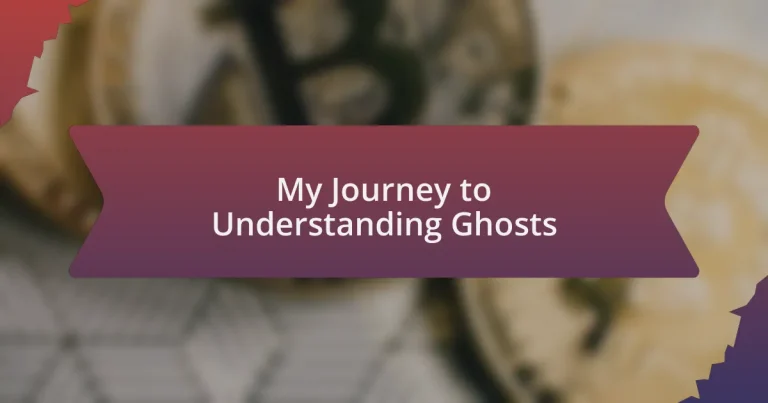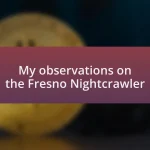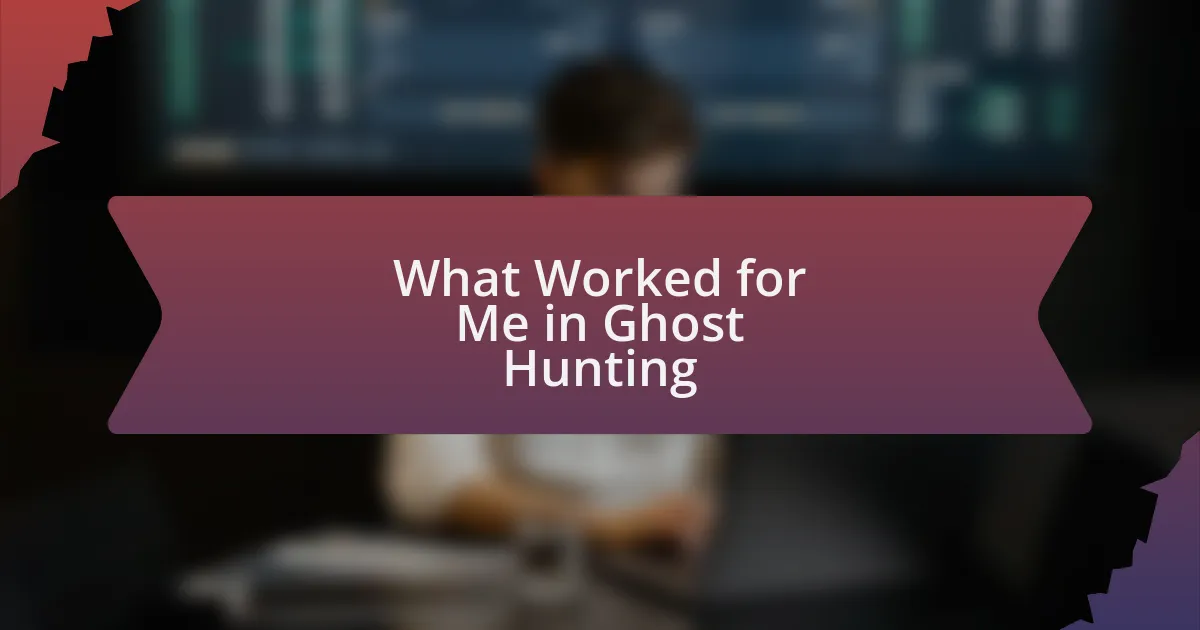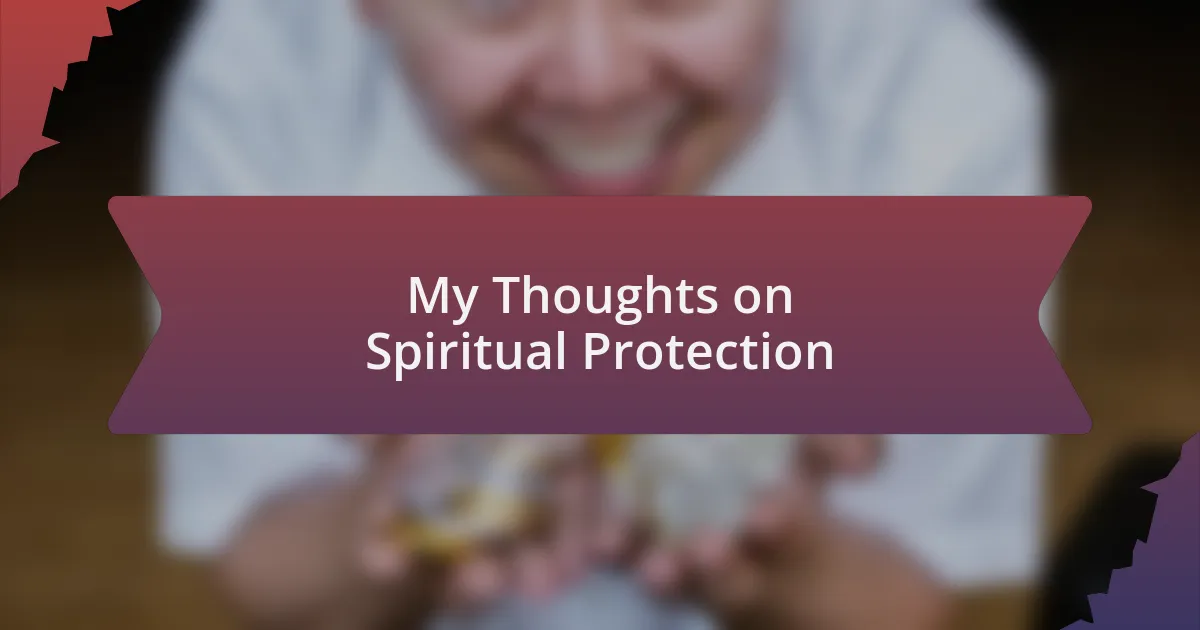Key takeaways:
- Paranormal podcasts not only entertain but create a sense of community among listeners who share personal ghost experiences.
- Ghost beliefs have evolved across cultures, influencing societal norms and reflecting deeper human emotions and fears.
- Common ghostly experiences, such as feelings of being watched and sudden temperature drops, blur the lines between reality and imagination.
- Engaging respectfully with ghosts can foster connection and provide insights that enrich personal growth and understanding of one’s lineage.
Author: Evelyn Hartman
Bio: Evelyn Hartman is a contemporary author known for her evocative storytelling and rich character development. With a background in psychology, she weaves intricate narratives that explore the complexities of human relationships and personal growth. Her debut novel, “Whispers in the Wind,” garnered critical acclaim and established her as a powerful voice in modern literature. Evelyn resides in the Pacific Northwest, where she draws inspiration from the vibrant landscapes and diverse communities around her. When she’s not writing, she enjoys hiking, gardening, and spending time with her two rescue dogs.
Understanding paranormal podcasts
Paranormal podcasts offer an intriguing glimpse into the unexplained, often blurring the lines between fact and fiction. As I first tuned into one, I was captivated by the hosts’ genuine enthusiasm for sharing ghost stories and personal encounters. It struck me: could these stories truly bridge the gap between our world and the unknown?
What draws us to these podcasts is not just the thrill of the supernatural, but also the community they foster. I remember engaging with listeners in online forums, sharing our own eerie experiences and debating the validity of various claims. It made me wonder—are we searching for validation of our own fears, or do we seek connection in a world often steeped in skepticism?
The format of paranormal podcasts allows for a diverse range of topics, from historical hauntings to modern-day sightings. I particularly enjoy episodes that feature expert interviews, as they provide a deeper understanding of paranormal phenomena. Listening to these discussions challenged my previous perceptions and invited me to explore my beliefs about what truly exists beyond our physical realm.
Exploring the concept of ghosts
The concept of ghosts fascinates many, but what is it that truly captivates us? In my own journey, I recall the first time I experienced a chilling encounter during a sleepover at a friend’s old house. The creaking floors, whispered voices, and fleeting shadows all seemed to whisper stories of those who once walked the halls, making me ponder: could these spirits be remnants of past lives still lingering around us?
When I began delving deeper into ghostly phenomena, I discovered that cultural interpretations vary widely. In some traditions, ghosts are viewed as benevolent guides, while in others, they are foreboding omens. I found it intriguing to compare notes with friends from different backgrounds, each adding layers to my understanding of what ghosts represent. It made me ask myself: how do our beliefs shape our perception of the afterlife?
My exploration led me to realize that ghosts often act as a reflection of our deepest fears and desires. One night while listening to an accounts-filled podcast, I heard a story that resonated with my own longing for connection with lost loved ones. It sparked a realization that these apparitions might not just be phantoms, but rather echoes of our memories and unfulfilled emotions, reminding us that perhaps there’s more to this life—as well as the next—than we commonly acknowledge.
History of ghost beliefs
Throughout history, the belief in ghosts has transcended cultures and eras, each with its unique interpretations. Ancient civilizations like the Egyptians saw the dead as travelers navigating the afterlife, often surrounded by elaborate tombs and artifacts to guide them. I can’t help but wonder if these rituals were born from a deep fear of the unknown, reflecting our intrinsic desire for connection even after death.
As I researched various cultures, I stumbled upon the folklore of the Celts, who envisioned spirits as protectors of nature and guides in the spiritual realm. This perspective truly struck a chord with me. It made me think: what if our own ancestors are watching over us, not in a haunting way, but rather as guardians? Such beliefs seem to resonate deeply, suggesting that our attachments to loved ones don’t vanish with death—they transform.
Interestingly, by the Middle Ages, the view of ghosts began to shift dramatically, often associated with superstition and punishment for sins. I recall reading about how people used to fear being haunted for wrongdoings, which led to a rise in ghost-related trials and confessions. It’s mind-boggling to consider how these beliefs influenced actions and societal norms; I can only imagine the fear that must have gripped those communities. What does it tell us about humanity’s evolving relationship with the unknown?
Common ghostly experiences
When I think about common ghostly experiences, the first thing that comes to mind is the feeling of being watched. Many people, including myself, have encountered this eerie sensation, often in dimly lit rooms or quiet corners. Isn’t it fascinating how our instincts can pick up on something intangible, making us question what may lurk in the shadows?
I’ve also often heard stories about disembodied voices or whispers, which seem to echo through the air, sending shivers down one’s spine. I remember a friend recounting a night spent in an old farmhouse, claiming to hear a name softly called in the dead of night. Was it merely a trick of the wind, or something more? Such experiences tend to blur the lines between reality and our imagination, leaving us to ponder the source.
Another prevalent occurrence is the sudden drop in temperature, often referred to as a “cold spot.” I once stood in a historic site where this happened, and it felt as though I had stepped into a different realm. After all, many believe that spirits can manipulate the environment around them. Could these phenomena be subtle reminders of those who once walked the earth, trying to connect with the living?
Lessons learned from ghost stories
When I reflect on the lessons learned from ghost stories, one powerful insight stands out: the importance of confronting our fears. I remember a chilling tale about a woman who faced her childhood fears of the dark after spending a night in a reputedly haunted house. She emerged not only unscathed but empowered, realizing that sometimes our fears hold the key to personal growth. Isn’t it intriguing how facing the unknown can spark such profound transformation?
Another significant lesson is the concept of connection—both with the past and each other. I once listened to a haunting account where a man felt compelled to uncover his family history after experiencing a ghostly encounter that seemed linked to his ancestors. This realization fostered a stronger bond with his roots, proving that ghost stories often serve as bridges across generations. How can we overlook the impact of our lineage on our present lives?
Furthermore, ghost stories often encourage us to cherish the present moment. In a podcast episode, a storyteller reminisced about the loss of a loved one, illustrating how the spirit’s visit reminded them to value their time with loved ones. This perspective invites us to appreciate life, knowing that it can be fleeting. Don’t you think it’s essential to make the most of our moments together, especially when the boundaries of life and death feel so fragile?
Tips for engaging with ghosts
When engaging with ghosts, a respectful approach is essential. I remember attending a paranormal investigation where we used calming language and offered small tokens, like flowers or letters, as gestures of goodwill. This simple act created a serene atmosphere, which I believe opened a channel for communication. How can we truly connect if we don’t first show respect?
Creating a comfortable environment is another crucial tip. During one of my own experiences, I turned down the lights and played soft music, instantly making the space feel inviting. I sensed that the spirits were more at ease, allowing for a clearer interaction. What if setting the right mood could reveal more than just echoes of the past?
Don’t underestimate the power of asking questions. When I posed an open-ended question during a séance, the responses were surprisingly insightful. By inviting spirits to share their stories, we not only honor their experiences but also enrich our own understanding. Isn’t it fascinating to think about how much wisdom can be gained from those who have walked the earth before us?





